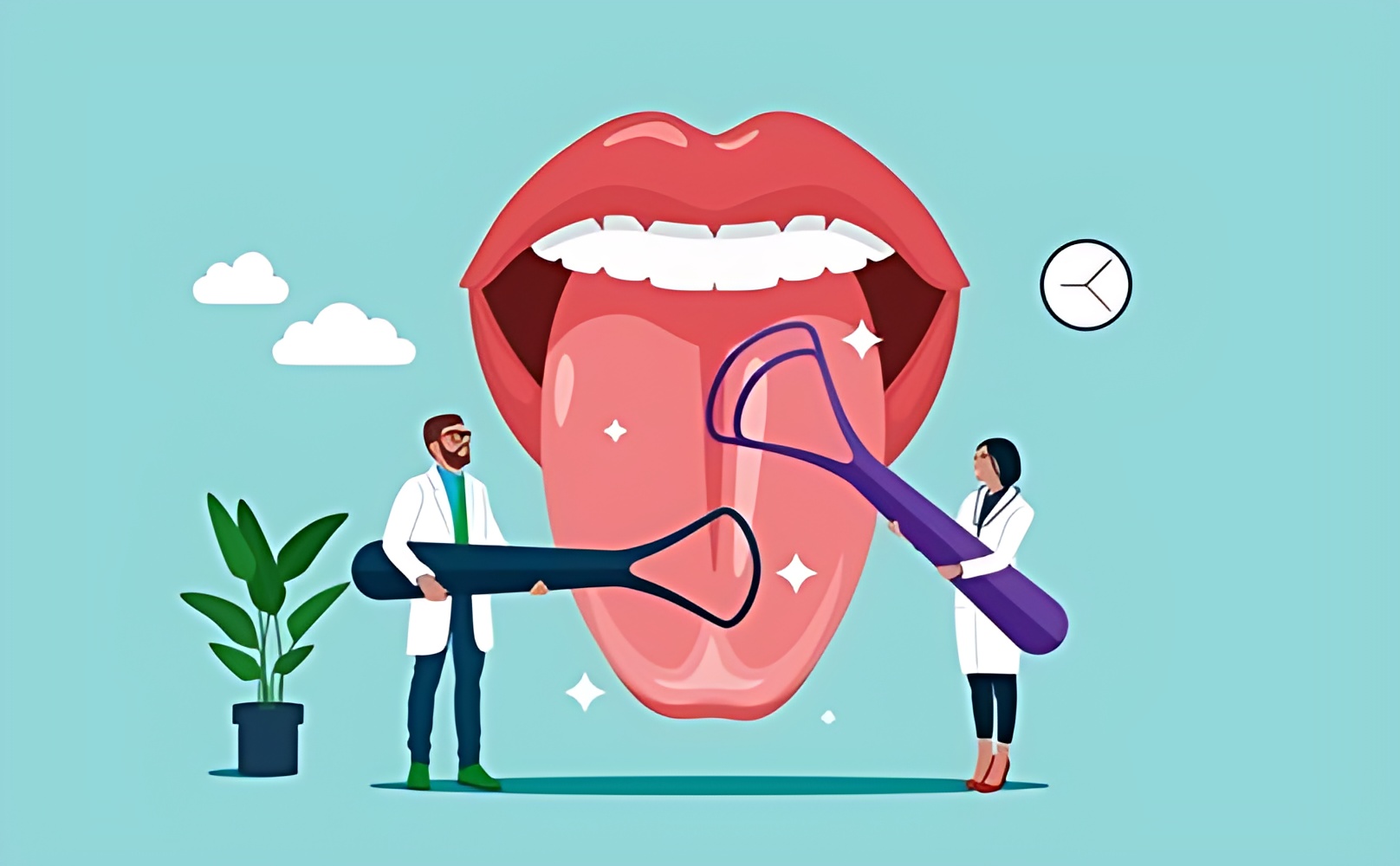What is the tongue?
The tongue is a muscle organ situated inside the oral cavity, serving vital activities such as gustation, speech, and the earliest phases of digestion.
What does the tongue do?
The tongue serves multiple functions in the oral cavity. It is a key player in the process of mastication, assisting in breaking down food during chewing. Additionally, the tongue contributes to speech formation by controlling airflow and articulation, and it houses taste buds that play a crucial role in the perception of different flavors, enhancing our overall sensory experience during eating.
Why is cleaning the tongue important?
Tongue cleaning is an essential but frequently neglected part of maintaining dental health. The tongue contains a substantial amount of germs, deceased cells, and food particles that are responsible for causing bad breath and problems related to dental health. Failure to clean the tongue enables the proliferation of these germs, resulting in a heightened susceptibility to cavities, gum disease, and other oral illnesses.Furthermore, maintaining a hygienic tongue improves the ability to perceive flavour, hence enhancing the overall pleasure of eating.

Also tongue and oral health can help reduce the risk of infection at the implant site. Regular cleaning and care of the tongue after implant surgery such as All on 4, All on 6 dental implants minimizes the risk of infection.
Integrating tongue cleaning into daily oral care routines not only aids in preventing oral problems but also supports overall health by reducing the potential for bacterial transfer to other parts of the body. In essence, a clean tongue is a key component in maintaining fresh breath and fostering optimal oral and systemic well-being.
What condition affects the tongue?
The condition of your tongue may provide valuable insights into your general well-being. Presented here are the symptoms that might impact your tongue and the corresponding underlying disorders they may indicate.
- Geographic Tongue (Benign Migratory Glossitis):This condition is characterized by patches on the tongue that resemble a map, with areas of red, smooth, and slightly raised spots. It is usually harmless but can cause discomfort.
- Oral Thrush (Candidiasis): Oral thrush, which is caused by a fungus infection called Candida albicans, results in the formation of white, creamy sores on the tongue and inner cheeks. It is more prevalent among those with compromised immune systems.
- Black Hairy Tongue: This ailment occurs when there is an excessive proliferation of germs on the tongue, leading to a black and hairy appearance. Factors that contribute to the issue include inadequate dental care, tobacco use, and certain drugs.
- Fissured Tongue: Characterized by deep grooves or furrows on the tongue's surface, fissured tongue is generally harmless but may trap food particles, leading to bad breath.
- Burning Mouth Syndrome: Burning Mouth Syndrome is a medical disorder characterised by a sense of burning on the tongue, lips, and sometimes throughout the whole mouth. The cause is often unclear, and it may be linked to various factors such as hormonal changes, nutritional deficiencies, or psychological factors.
- Leukoplakia: Identified by thick, white patches on the tongue and other areas of the mouth, leukoplakia is often associated with tobacco use. While it can be benign, it may indicate precancerous changes and requires professional evaluation.
- Mucocele: Typically occurring on the underside of the tongue, a mucocele results from a blocked or damaged salivary gland duct, leading to the formation of a painless, fluid-filled bump.
- Tongue Cancer: Though less common, cancer can affect the tongue. Symptoms may include persistent ulcers, swelling, and difficulty swallowing. Early detection is crucial for effective treatment.
How can I make my tongue healthier?
Maintaining a healthy tongue involves simple yet effective practices.
- Start by incorporating regular tongue cleaning into your oral hygiene routine using a tongue scraper or your toothbrush.
- Gently brush your tongue's surface to remove bacteria, dead cells, and food particles that contribute to bad breath and oral health issues.
- Stay hydrated, as a dry mouth can promote bacterial growth.
- Consume a balanced diet rich in vitamins and minerals, and limit sugary and acidic foods.
- Regular dental check-ups are essential to detect and address any tongue-related issues early.
- Lastly, be mindful of lifestyle choices, such as avoiding tobacco use and excessive alcohol consumption, which can negatively impact tongue health
Consistent care and attention to these habits contribute to a healthier and more vibrant tongue.

How do you know if your tongue is not healthy?
Recognizing if your tongue is not healthy involves being attentive to various signs and symptoms. Here are indicators that may suggest tongue-related issues:
| Some signs and symptoms about unhealthy tongue; |
| Discoloration |
| A thick or persistent coating on the tongue's surface |
| Pain or Discomfort |
| Changes in texture; abnormalities like lumps, bumps |
| Swelling |
| Persistent Bad Breath |
| Difficulty Swallowing or Speaking |
| Unexplained Bleeding |
How often should you clean your tongue?
It is advisable to include tongue cleaning into your everyday oral hygiene regimen. Optimally, this should be performed on a regular basis, ideally twice a day — once in the morning and once before going to sleep. Also use a tongue scraper or the bristles of your toothbrush to gently remove bacteria and debris from the tongue's surface.
Contact our Bronze Dental Clinic in Antalya Turkey
A healthy tongue is a good sign of our overall health and serves many key roles. Maintaining tongue health is essential for improving overall dental health and enjoyment of life. Paying attention to tongue health via regular dental check-ups and good cleanliness practices may lead to a healthier mouth and a longer life.
Our dental clinic in Antalya, Turkey provides services with modern technology and expert dentists to protect and treat your oral and dental health. Do not delay in contacting us.
